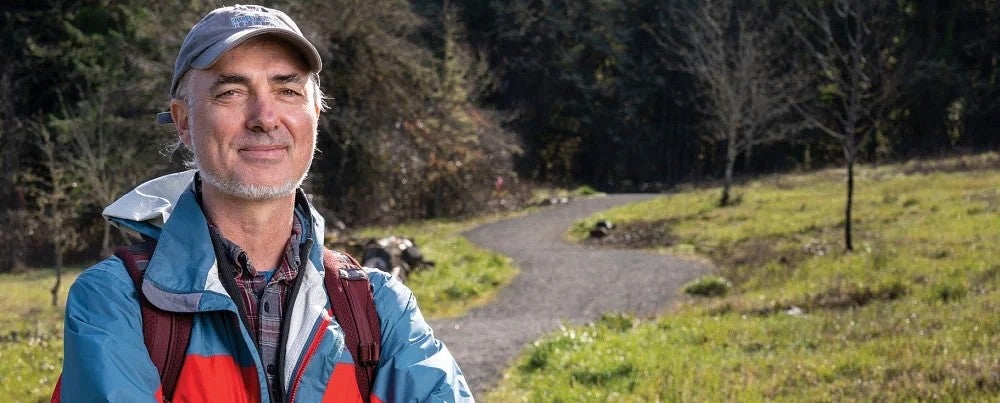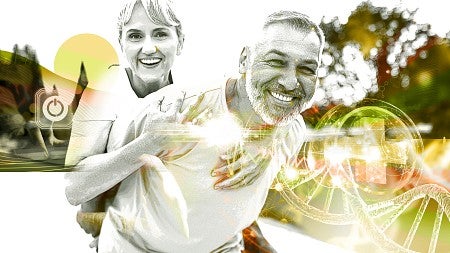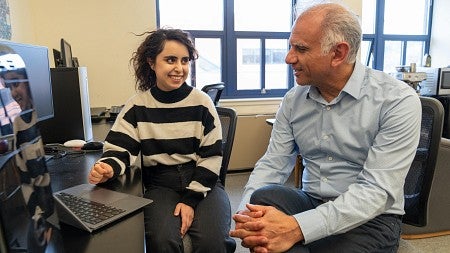
Faculty Profile: Nick Kohler, Geography
Geography professor shares how interactions with the outdoors are the best, and only, way to study the natural world
By Tim Christie • Photos by Chris Larsen • April 14, 2020
2 min read
In his nature
Nick Kohler was running down a trail on Maui with his brothers, his low-top Converse sneakers skipping along the path, when he twisted his leg, felt something give, and found himself lying on the ground.
“Oh my God,” he thought, “my leg is in the wrong place.”
Kohler had dislocated his hip. As his brothers raced down the hill to the rental car to get him to a hospital, Kohler considered his predicament and his surroundings.
“It’s terrible, it hurts,” he remembers thinking. “And then I could look out and there’s this amazing view of [the volcano] Haleakalā, and there is a bay with humpback whales out there, and they’re spouting occasionally.
“It was an interesting juxtaposition.”
These intersections between humans and the natural world are of particular interest to Kohler. He’s exploring how adventurous and recreational activities transform landscapes and cultures in a course called Hike, Bike, Skate, Ski, Surf—Geographies of Adventure and Active Leisure. Nick created the course with funding and support while he was a 2018-19 OHC Coleman-Guitteau Professor in the Humanities.
The course, first offered last spring, combines online lectures and exercises with field trips. Kohler teaches students to view geography through the prism of outdoor activities, encouraging them to think about how people experience place and how geographical locations are shaped by recreation.
Skateboarding wake-up call
Kohler, 53, grew up on the outskirts of Denver and spent a lot of time outdoors with his family. Today, he skis, skateboards, hikes, and fishes—though he has paid a price for his adventures. “I’ve injured myself in all of these sports,” he says. “I’ve dislocated a shoulder and my hip and I’ve got scars here and there from biking and skiing and hiking.”
He recalled recently suffering a skateboard accident on campus, caused by thinking about teaching a class on skateboarding rather than concentrating on the actual skating. “It was a very meta wipeout,” he says.
The impacts of adventure tourism
Kohler earned his bachelor’s degree at Princeton and spent time in Thailand and Montana before coming to the UO for graduate school. He completed a master’s in 1997 and a PhD in 2005, both in geography, and then became an instructor.
The course is taught partly online, with lectures and exercises, and partly in the field, with trips and workshops in the outdoors.
Kohler asks students to examine questions such as how adventure tourism affects local economies and indigenous cultures; how gender, race, and income influence a person’s access to outdoor recreation; and is it OK to risk your life having fun?
An element of risk
Outdoor sports force participants to pay attention to their environment, Kohler says. Skiers judge the quality and depth of snow. Skateboarders are tuned in to the smoothness and pitch of the pavement. Surfers gauge the size and power of waves.
Whether navigating a big slope, a monster wave, or a wild river, these sports are risky—but that sense of danger can be an important element in how people choose to experience the world.
Says Kohler: “I have lots of amazing memories of places that I think are more memorable because of the way I experienced them.”
Like that time he was running down a trail in Hawaii.
Tim Christie is a staff writer for University Communications.




